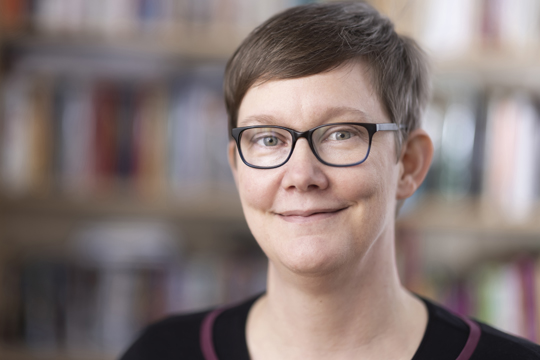A Scout for International Science
Freiburg, Feb 16, 2021
Hunting for talent: Freiburg Islamic scholar Professor Dr. Johanna Pink is one of a total 33 scouts in Germany who are part of the Alexander von Humboldt Foundation’s new Henriette Herz Scouting Programme to promote the international exchange of academics. Over the next three years Pink is hoping to recommend up to three researchers from abroad for a scholarship at the University of Freiburg. Apart from a few formalities there is no further selection process and the lucky ones who are recommended will receive the scholarship directly. Franziska Becker talked to the Freiburg researcher about why she wanted to be a part of this program.

Johanna Pink usually only sees colleagues from her field of research at international conferences – she is looking forward to inviting researchers who work in similar areas to Freiburg. Photo: Jürgen Gocke
Ms Pink, you’re hard at work emulating the renowned explorer Alexander von Humboldt. Do you feel like an explorer of science yourself?
Johanna Pink: I compare it more to a scout for football or another professional sport: I’m hunting for previously undiscovered talent on behalf of the foundation.
What is the Henriette Herz Scouting Programme?
The Humboldt foundation realized that it was not recruiting as many outstanding scientists in some countries than in others. By far the largest group of scholarship holders and prize-winners comes from North America and Western Europe. Regions from the global south are underrepresented. But as these countries have their own program of scholarships the assumption was that the opportunity was too little known there, or perhaps the application process was offputting. On top of this the number of women amongst the scholarship holders has been too small until now. So the first person I want to scout out must be a woman. The Humboldt foundation hopes that it will be easier for scouts to speak directly to people who meet the funding criteria. This includes for example that they must have taken their PhD no more than twelve years ago.
Why did you apply to be a scout?
When I read the invitation I thought straight away: I’m in the ideal position to find scientists that the Humboldt foundation would like to support, because I research in countries where they are looking for scholarships. Scouting also strengthens and enlarges my international network. I work every day with people located in many different countries. Now I have the opportunity to work with them in Germany too. I find that extremely attractive.
What does being a scout involve?
It all begins with identifying the right people: it has to be someone who is working in an area that is close enough to mine for us to both benefit from it if they were here. In addition they must have already published significant articles in their field and be committed to research more than the average – by the standards of their country. In brief, they’d have to be able to succeed in the normal Humboldt process as well.
Do you already have someone in mind who you’d like to support?
At present I’m in conversation with two young scientists who I’d like to nominate. Over the next three years I can invite a total of three people who can each stay at the University of Freiburg for up to two years. Sadly I’ve also discovered that there can be conflicting goals when selecting candidates: for instance I have very good networks in Indonesia, but there are hardly any female postdocs in my area of research there. The few who would be possible can’t speak English well enough. So I’ve asked my international colleagues, for example postdocs and doctoral students, for recommendations and suggestions.
What do you think is the role of cooperation with international colleagues?
I don’t know anyone here locally working in my specific field, because I work in a small specialism and at a small institution. In addition my research focuses on transregional and global questions. I’m mainly engaged with Muslim exegesis of the Koran and the translation of the Koran in several linguistic areas. I wouldn’t get anywhere with this if I didn’t look to cooperate with people in those regions.
What’s the significance of your activities to the University of Freiburg?
The Humboldt foundation is the key sponsor for international scientific cooperations. So given the University of Freiburg’s internationalization strategy it’s an extremely important partner. My participation in the scouting program makes us more visible: in this first selection round for scouts I’m the only professor from Freiburg; some other universities in Germany aren’t even represented at all.

